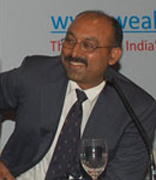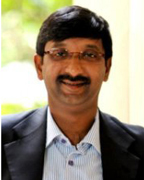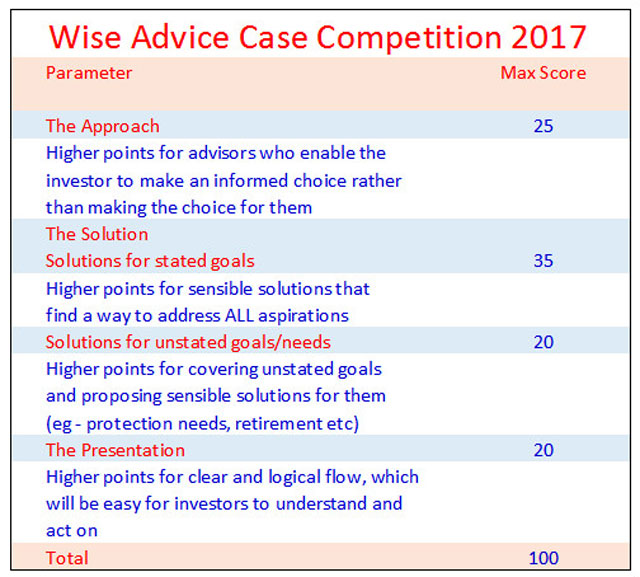|

Read this case study and send us your inputs on how and what you will advise, and why.
A three-member independent jury will decide who the Wisest Advisors are.
Our eminent jury:

Ashish Chadha
Chadha Investment
Delhi
|

Shrikant Bhagavat
Hexagon Wealth
Banglore
|

Vinod Jain
Jain Investment
Mumbai
|
Wise Advice Case Competition 2017
The Case
63 year old Pune based Mohan Kulkarni has always prided himself on being a prudent planner - a trait that earned him many laurels during his 33 year career at the MNC he served, rising to the level of Works Manager, responsible for production at the company's main factory, until he retired from there 3 years ago. Events over the last year have however not been very kind on Mohan and his wife Swati, and have left them a little dazed and confused on the road ahead on what was supposed to be their carefully planned blissful golden years together.
A couple of years before he retired, Mohan invested a major portion of his carefully accumulated savings over the years into a 3 bedroom house in a comfortable locality, moved out from the company leased accommodation, and into his own house, to ensure that Swati and he get comfortable with the neighbourhood well ahead of his retirement. The same year, they conducted the marriage of their daughter and only child, Varsha, at a scale that left them feeling happy and fulfilled as parents.
Mohan had utilized his retiral benefits, residual savings and commutation of his superannuation fund to create a Rs. 2 crore retirement fund, which he invested 50% in a 3 year 8% bank deposit and the balance 50% in three low-equity hybrid funds. His Rs. 1 cr mutual fund portfolio had a 25% equity and 75% debt allocation. He had no liabilities, and his net worth between his financial portfolio and his house stood at Rs.3.5 crores when he commenced his retired life.
He had done his homework well - he attended the company sponsored investment education sessions, understood from the experts the importance of balancing current income vs fighting long term inflation, and had managed to convince an otherwise sceptical Swati about the need to invest half his corpus in low equity hybrid funds (while she wanted all of it in safe bank deposits). What swung the deal was his calculation that between his monthly superannuation (from the uncommuted portion) of Rs.25,000 and the quarterly interest from his bank deposits, they would be able to comfortably meet their present monthly expenses of Rs.75,000. His plan was to dip into the low equity hybrid funds once a year to fund their annual vacations which he estimated would cost them Rs.400,000 - otherwise, the plan was to allow this portion to grow steadily over the years, and be handy in due course to supplement his income when inflation got the better of his interest income. In his meticulously planned way, he had worked out plans for Swati and him to see the world over the next 15 years, while he believed they would still be fit to travel and enjoy.
But events of the last 12 months have unsettled him and his carefully crafted plans. His mother fought a long and painful battle against failing kidneys and multiple complications before finally giving up. Mohan did his best to support her medically, emotionally, financially. He knew he did all he could. The only niggling worry for him now on that score was it set him back by Rs. 26 lakhs. Redemptions from his low equity hybrids meant that he was back to square one - a current value of Rs.1 crore. And he realized he hadn't factored in these kinds of expenses for Swati and himself, and had neglected to consider health insurance.
That was however the least of his concerns right now. Varsha and her 2 year old Rohan had come back home, after a failed marriage. She had abandoned a promising career as a software engineer in Pune when she married and relocated to Nagpur 5 years ago. Now, she had to pick up the threads from where she had left off, and prospects were not looking particularly bright for her. A lot had changed in her professional world - new technologies had to be learnt, even as job prospects in the sector looked dim, with most IT majors reducing rather than expanding headcount to deal with the onslaught of AI and visa curbs.
Mohan went back to the drawing board to relook at his finances. He now estimates a monthly expenditure of Rs.100,000 with two additions into the household. He doesn't quite know how long he will have to support Varsha financially, but is obviously committed to it for however long it takes. Meanwhile, Swati's focus is on supporting Varsha in her quest to stand on her own feet, and lead an independent and successful life. Swati believes they should buy a small house for Varsha, in her name, to give her a sense of security. As luck would have it, a 1 bedroom flat in the next building has come up for sale, and Swati is very keen to pay Rs.60 lakhs and grab it for Varsha - that way, whenever Varsha stabilizes her professional life and wishes to live independently, she can still be close, and Swati can take care of Rohan during Varsha's working hours.
Mohan understands Swati's feelings, but is worried about such a large hole in his Rs. 2 crore retirement corpus. He tries to reason with Swati that after all Varsha is their only child, she has full rights over their 3 bedroom house - now as well as after their time - so why buy another house now? Swati believes Mohan doesn't get the importance of making Varsha feel independent and secure as soon as possible.
Mohan is in a bind on the house purchase decision. If they finally go ahead and buy the house, there is a further level of complication for him - Swati is reluctant to break their deposits to fund this purchase, because she believes there is now a greater need for regular monthly income. News from the bank that the FD will now be renewed at 6.5% interest instead of 8%, doesn't help matters at all. The other option of dipping into his mutual funds solves his immediate problem, but he is convinced, will set him up for a lot of financial pressure in later years. But on the other hand, as he hears conflicting views on markets as they make new life time highs with the Sensex scaling 30,000 and marching ahead, there is another dimension to this problem that he has to deal with. Some experts warn about the perils of investing at market highs, others sound confident about the long term prospects of equity markets. With conflicting opinions on markets, he hesitates to make a stronger case to Swati why the bank deposits should fund the house purchase and not his mutual funds. He wonders whether he should instead renew his suggestion of not going ahead with the house purchase for Varsha, but is uncomfortable with the thought of putting his interests ahead of his daughter's.
Girish, a trusted family friend, understands Mohan's and Swati's dilemma and recommends them to meet you. You have served Girish well over the years as his financial advisor and Girish believes you are well placed to help Mohan and Swati navigate through this challenging phase successfully.
What advice will you give Mohan and Swati and why? Please support your advice with necessary plans and numbers. You are aware that beyond numbers, there are conflicting emotions and aspirations that need to be sensitively handled.
Next steps
When drafting your response to this case study, please remember to address three aspects: what will you advise, why will you advise this and how will you advise them.
Here is the evaluation matrix that our jury will use to evaluate your responses - please go through the parameters as well as weightages before drafting your response:

Please mention the following details in the covering mail to your response: Name, Firm name, ARN/RIA No, City, Email id, Mobile number. All these details must be provided in your covering email only. Your identity should not be disclosed in the pdf/doc files and other attachments you may append to your actual response to this case study. The jury would like to evaluate your responses without any name bias potentially creeping in.
The Wise Advice case competition is open to all - distributors, advisors, wealth managers, employees of wealth management firms.
Responses can be sent in doc/pdf files with supporting excel sheets if you desire. You can also embed excel workings into the doc/pdf file.
There is no word limit - but you must understand as a wise advisor, that you need to strike a good balance between brevity and verbosity. How you present your advice is as important as what you present - please remember you are dealing with a family that needs guidance to navigate through difficult options in a challenging situation.
Winners will be awarded with Wise Advisor trophies at the 8th annual Wealth Forum Platinum Circle Advisors Conference on July 7 and 8, 2017. Your winning advice will be shared with conference participants, and will also be featured in Wise Advice.
Winners will have a huge feather in their cap to present to clients and prospects - having been adjudged the among the wisest advisors in India, by the advisory fraternity, in India's most challenging competition for financial advisors!
Please write "Wise Advice Case Competition" as the subject of your email.
Happy advising! May the Wisest win!
|
View the 2016 edition of the Wise Advice Case Competition here:
The case: Click here
Evaluation parameters and the short-listed top 20: Click here
Winning solutions of top 5 (Part 1): Click here
Winning solutions of top 5 (Part II): Click here
The awards ceremony: Click here
|
Share this article
|